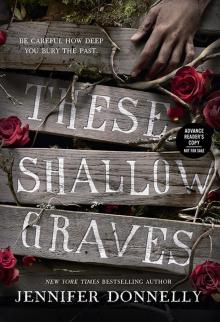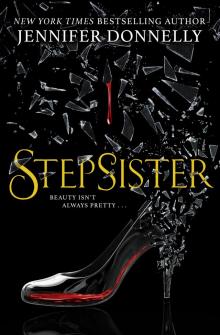- Home
- Jennifer Donnelly
Stepsister Page 4
Stepsister Read online
Page 4
“I’m afraid not. Saint-Michel.”
“Never heard of it.”
“It’s in the country.”
“I hate the country. Why are we going there?”
Chance’s hands tightened on the gunwale. He thought of the girl’s map. Isabelle, her name was. He pictured the end of her path. The splotches of red. The violent lines etched into the parchment, as if a madman had made them.
And then he remembered that a madman had.
“It can be changed, her path,” he whispered. “I can change it. I will change it.”
“What path?” the cook asked. “What are you talking about? Why are you …”
His words trailed off. Something down below them had caught his attention. Chance saw it, too.
A swift black carriage was making its way up the bustling street that ran alongside the docks. A face was framed in its window—a woman’s face, pale and wizened. She must’ve sensed that she was being watched, for she suddenly looked up. Her gray eyes found Chance’s and held them. In her merciless gaze, he saw that no quarter would be asked in this fight and none given.
The cook took a deep breath, then blew it out again. “She’s the reason we’re here, isn’t she?” he asked.
Chance nodded.
“That is not good. She’s the worst of the three, and that’s saying something. Why has she come? Why have we? Are you ever going to tell me?”
“To do battle,” Chance replied.
“For what this time? Gold? Glory? Your pride?” There was a cutting tone to his voice.
Chance watched Fate’s carriage round a corner and disappear, and then he replied, “For a soul. A girl’s soul.”
The cook nodded. “You should have said so. That’s a thing worth fighting for.”
The bleary look had left the cook’s face; a determined one had taken its place. He put his forefingers in his mouth and blew an earsplitting whistle. Then he strode off, bellowing at a hapless sailor, demanding that the man get the blasted gangplank down. The magician, the acrobats, and the rest of Chance’s entourage, all milling about on deck, gathered their things and hurried after him.
Chance picked up his satchel, slung it over his shoulder, and followed his cook. If he had any hope of winning this fight, he needed to stay one step ahead of Fate, and already he was ten steps behind her.
Isabelle, sweaty, dirty, and bruised, leaned forward in her saddle and addressed her horse.
“Maman tried to sell you, Martin. Did you know that? To the slaughterhouse, where they’d boil your bones down for glue. I’m the one who stopped her. Maybe you should think about that.”
Old, slow, and bad-tempered, Martin was also swaybacked, splay-toed, and nippy, but he was all Isabelle had.
“Come on,” she urged him. She pressed her heels into his flanks, trying to get him to trot around the barnyard. But Martin had other ideas. He heaved himself into a sulky canter, then stopped short—sending her tumbling out of her saddle. She hit the ground hard, rolled onto her back, and lay in the dirt groaning.
It was the third time Martin had thrown her that morning. Isabelle was a skilled rider, but everything was different now. She couldn’t get her weight right in her stirrups. There was no purchase where the toes of her right foot should’ve gripped the tread. Unable to balance properly, she had difficulty correcting when Martin reared, bucked, or simply stopped dead.
The falls didn’t discourage her, though. She didn’t care about the dirt in her face, the bruises, the pain. They kept her from remembering that Ella was gone. That Ella had won. That Ella had everything now and she had nothing.
She was still lying on the ground, staring up at the clouds scudding across the sky, when a face leaned over her, blocking them out.
“How many times have you fallen today?” Tavi asked. She didn’t wait for an answer. “You’ll kill yourself.”
“If I’m lucky.”
“Stop this. You can’t ride anymore.”
Fear pooled in Isabelle’s belly at the very thought. It wasn’t true. She wouldn’t let it be true. Riding was all she had left. It was the only thing that had kept her going as her foot healed. As she got used to hobbling instead of walking. As the servants left. As Maman closed the shutters and locked the doors. As the weeds grew over the stone walls.
“Why are you here?” she asked Tavi. Her sister preferred to stay inside with her books and equations.
“To tell you that we have to go to the market. We can’t put it off any longer.”
Isabelle blinked at her. “That’s not a good idea.”
Word had spread. About the glass slipper and what they’d done to themselves to fit into it. About Ella and how they’d treated her. Children threw mud at their house. A man had pitched a rock through one of their windows. Isabelle knew they would only be inviting more trouble if they went to the village.
“Do you have a better one?” asked Tavi. “We need cheese. Ham. Butter. We haven’t tasted bread in weeks.”
Isabelle sighed. She stood up and brushed herself off. “We’ll have to take the cart,” she said. “We can’t walk. Not with our—”
“Fine. Hitch up Martin. I’ll gather some baskets,” Tavi said brusquely, starting for the kitchen. She didn’t like talking about their injuries. Ella. Any of it.
“Fine,” Isabelle said, limping over to her horse.
She hadn’t gotten used to her slow, lurching gait. Tavi’s injury was not as severe. After it had healed, her stride had returned to normal. Isabelle doubted hers ever would.
“And, Izzy …”
Isabelle turned around. Tavi was frowning.
“What?”
“Behave. In the village. Do you think you can?”
Isabelle waved Tavi’s question away and picked up Martin’s reins. But the truth was, she had no idea if she could. She’d tried to behave. For years. In drawing rooms and ballrooms, at garden parties and dinners. With her hands knotted and her jaw clenched, she’d tried to be all the things Maman told her to be: pleasant, sweet, considerate, kind, demure, gentle, patient, agreeable, and self-effacing.
Occasionally it worked. For a day or two. But then something always happened.
Like the time, at a fancy dinner Maman had hosted, a cadet back from his first year at the military academy said that the Second Punic War ended after Scipio defeated Hannibal at the Battle of Cannae, when any fool knew it was the Battle of Zama. Isabelle had corrected him, and he’d laughed, saying she didn’t know what she was talking about. After she got her favorite book—An Illustrated History of the World’s Greatest Military Commanders—from her library and proved that she did, in fact, know what she was talking about, he’d called her an unpleasant name. Under his breath. Furious, she’d called him one back. Not under her breath.
Maman hadn’t spoken to her for a week.
And then there was the time she’d attended a ball at a baroness’s château, gotten bored with the dancing, and decided to take a walk. She never meant to get into a duel with the baron, but he’d found her admiring a pair of sabers mounted on a wall in the foyer and offered to show her his moves. She’d shown him hers, too, slicing several buttons off his jacket and nicking his chin in the process.
That time, Maman had given her the silent treatment for a month.
Her mother had said her behavior was atrocious, but Isabelle didn’t think cutting off a baron’s buttons was all that bad. She knew she was capable of worse. Much worse.
Just a few months ago, she’d been searching in her wardrobe for the pink parasol Maman insisted that she carry—Pink enhances the complexion, Isabelle!—and a pair of horrible silk slippers—Too bad if they pinch, they make your feet look small!—and had found a book on Alexander the Great that she’d hidden to keep Maman from taking it away.
She’d sat down on the floor of her bedchamber, rumpling her fussy dress, and had eagerly opened the book. It was a relic from a happier time, a time before she’d been made to understand that warriors and generals were
men, and that showing an interest in swords and warhorses and battlefield strategies was unbecoming in a girl. As Isabelle had turned the book’s pages, she’d found herself once again fighting alongside Alexander as he battled his way through Egypt. Tears of longing had welled in her eyes as she’d read.
Just as she’d been wiping them away, Ella had walked into the room, carrying a silver tray. On it she’d placed a cup of hot chocolate and a plate of madeleines.
“I heard Maman shouting at you about the parasol and the slippers. I thought this might help,” she’d said, setting the tray down next to Isabelle.
It had been a kind thing to do. But Ella’s kindnesses only ever made Isabelle angry.
She’d looked at her stepsister, who had no need of parasols and pinchy shoes. Who looked like a goddess in a patched dress and an old pair of boots. She looked down at herself, awkward and gauche in the ridiculous gown, and then she’d picked up the cup of hot chocolate and hurled it at the wall. The madeleines had followed it. The silver tray, too.
“Clean it up,” she’d ordered, a nasty glint in her eyes.
“Isabelle, why are you so upset?” Ella had asked, wounded.
Seething, her hands clenched, Isabelle said, “Stop, Ella. Stop being nice to me. Just stop!”
“I’m sorry,” Ella had said meekly as she’d bent down to pick up the broken pieces.
That meekness should have mollified Isabelle, but it had only fueled her anger.
“You’re pathetic!” she’d shouted. “Why don’t you ever stick up for yourself? You let Maman bully you! You’re kind to me and Tavi even though we’re horrible to you! Why, Ella?”
Ella had carefully put the shards of porcelain on the tray. “To try to undo all of this. To make things better,” she’d replied softly.
“You can’t make things better. Not unless you can change me into you!”
Ella had looked up, stricken. “Don’t say that. Don’t ever change into me. Ever.”
Isabelle had stopped shouting, struck silent for a moment by the vehemence of Ella’s words. And then Maman’s footsteps had been heard in the hallway, and it had been all Isabelle could do to hide her book and grab her parasol before her mother was in the room, shouting at her to hurry up. They’d left for a garden party minutes later, one so mind-numbingly dull that Isabelle had forgotten her intention to press Ella for an answer. And now it was too late.
Martin, tired of standing still, nipped Isabelle’s arm sharply, dispelling her painful memories.
“You’re not much good at behaving, either, are you, old man?” she said to him.
She led the horse into the cool stone stables and removed his tack. She didn’t need to tie him. Martin was a horse of few ambitions and running off was not one of them. Before putting his harness on, she gave him a quick brushing. It wasn’t necessary; he hadn’t been worked very hard, but Isabelle craved the feel of him under her hands, the velvet of his nose against her cheek, his gusty, grassy breath.
When she finished, she led him to the cart. As they walked through the stables, Isabelle glanced at the empty stalls. The pair of graceful Arabians that had pulled the carriage, and the huge Percherons who’d worked the fields, were gone, sold off after the groom left.
Though she tried not to, Isabelle couldn’t help looking at the very last stall. It brought memories, too. The horse that had lived in it had also been sold. Years ago. Nero. A black stallion seventeen hands high, with onyx eyes and a mane like rippling silk. Riding him was like riding a storm. She could still feel his strength as he stamped and danced underneath her, impatient to be off.
She could feel Felix, too. He was sitting behind her, his arms around her waist, his lips by her ear, his eyes on the stone wall ahead of them. He was laughing, and in his laugh was a dare.
“Don’t, Isabelle!” Ella had called out. “It’s too dangerous!”
But Isabelle hadn’t listened. She’d touched her heels to Nero’s sides, and an instant later, they were galloping straight at the wall. Ella had covered her eyes with her hands. Isabelle had leaned forward in her saddle, her chest over Nero’s neck, her hands high up in his mane, Felix leaning with her. She’d felt every muscle in the stallion’s body tense, and then she’d felt what it was like to fly. She and Felix had whooped as they landed, then they’d streaked across the meadow and into the Wildwood, leaving Ella behind.
As quickly as they’d come, the images faded and all that was left was an empty stall with cobwebs in the corners.
Nero was gone. Felix, too. Taken away by Maman like so many other things—her leather britches, her pirate’s hat, the shiny rocks and animal skulls and bird nests she’d collected. Her wooden sword. Her books. One by one they’d all disappeared, each loss like the swipe of a carver’s knife. Whittling her down. Smoothing her edges. Making her more like the girl Maman wanted her to be.
Isabelle had cut off her toes, but sometimes she could still feel them.
Maman had cut out her heart.
Sometimes, she could still feel that, too.
“Six sous,” the baker’s wife said, her meaty arms crossed over her huge, freckled bosom.
“Six?” Isabelle echoed, confused. “But the sign says three.” She pointed to a slate on the baker’s stall with a price marked on it in chalk.
The woman spat on her palm, rubbed the 3 away and wrote 6 in its place. “For you, six,” she said insolently.
“But that’s double the price. It’s not fair!” Isabelle protested.
“Neither is treating your stepsister like a slave,” said the woman. “Don’t deny it. You were cruel to a defenseless girl. Got your comeuppance, though, didn’t you? Ella is queen now and more beautiful than ever. And you? You’re nothing more than her ugly stepsister.”
Isabelle lowered her head, her cheeks flaming. She and Tavi had only just arrived at the market and already the taunts were starting.
Taking a deep, steadying breath, she remembered her sister’s directive: Behave. She counted out coins from her pocket and handed them over. The baker’s wife gave her an undersized loaf, burned on the bottom, and a sneering smile to go with it.
“Serves her right,” said a woman standing in line.
“Burned bread’s too good for her,” sniffed another.
The women stood there, nodding and pointing and making remarks, basting themselves in righteousness like geese on a spit, when just yesterday the first had slapped her small daughter so hard for spilling milk that the child’s cheek still bore a welt, and the second had kissed her sister’s husband behind the tavern.
No one jeers louder at a hanging than the cutthroat who got away.
“I hope you choke on it,” said the baker’s wife as Isabelle fumbled the loaf into her basket.
Isabelle felt anger kindle inside her. Harsh words rose in her throat, but she bit them back.
“I hope your ugly sister chokes, too.”
At the mention of her sister—Tavi, who’d grown thin since Ella had left, who rarely smiled and barely ate—Isabelle’s smoldering temper ignited.
The centerpiece of the baker’s display was a carefully constructed pyramid of shiny brown rolls. Isabelle cocked her arm back and smacked the top off. A dozen rolls tumbled off the table and landed in the muddy street.
“Choke on that,” she said to the spluttering baker’s wife and her squawking customers.
The look on the woman’s face, her shriek of outrage, her dismay—they all felt good, for a moment. I won, Isabelle thought. But as she limped away from the stall, she realized, with a sick, sinking feeling, that she hadn’t won. Her anger had. Once again.
Ella would not have done that, she thought. Ella would have disarmed them all with a sweet smile and soft words.
Ella was never angry. Not when she’d had to cook and clean for them. Or eat her meals alone in the kitchen. Not even when Maman wouldn’t let her go to the ball.
Ella had had a cold room in the attic and a hard bed; Isabelle and Tavi had blazing fires in their
bedchambers, and feather mattresses. Ella had had only a tattered dress to wear, while Isabelle and Tavi had dozens of pretty gowns. Yet day after day, it was Ella who sang, Ella who smiled. Not Isabelle. Not Tavi.
“Why?” Isabelle asked herself, desperate for an answer, certain that if she could get it, she could learn to be good and kind, too. But no answer came, only a pain, deep and gnawing, on the left side of her chest.
Had Isabelle asked the old wives of Saint-Michel, all sitting by the fountain in the village square, they could have told her what caused it. For the old wives have a saying: Never is a wolf more dangerous than when he’s in a cage.
At the edge of Saint-Michel is the Wildwood. The wolves who live there come out at night. They prowl fields and farms, hungry for hens and tender young lambs. But there is another sort of wolf, one that’s far more treacherous. This is the wolf the old ones speak of.
“Run if you see him,” they tell their granddaughters. “His tongue is silver, but his teeth are sharp. If he gets hold of you, he’ll eat you alive.”
Most of the village girls do what they’re told, but occasionally one does not. She stands her ground, looks the wolf in the eye, and falls in love with him.
People see her run to the woods at night. They see her the next morning with leaves in her hair and blood on her lips. This is not proper, they say. A girl should not love a wolf.
So they decide to intervene. They come after the wolf with guns and swords. They hunt him down in the Wildwood. But the girl is with him and sees them coming.
The people raise their rifles and take aim. The girl opens her mouth to scream, and as she does, the wolf jumps inside it. Quickly the girl swallows him whole, teeth and claws and fur. He curls up under her heart.
The villagers lower their weapons and go home. The girl heaves a sigh of relief. She believes this arrangement will work. She thinks she can be satisfied with memories of the wolf’s golden eyes. She thinks the wolf will be happy with a warm place to sleep.

 Rogue Wave
Rogue Wave Waterfire Saga, Book One: Deep Blue (A Waterfire Saga Novel)
Waterfire Saga, Book One: Deep Blue (A Waterfire Saga Novel) Revolution
Revolution The Wild Rose
The Wild Rose Waterfire Saga (4 Book Series)
Waterfire Saga (4 Book Series) These Shallow Graves
These Shallow Graves Beauty and the Beast: Lost in a Book
Beauty and the Beast: Lost in a Book A Northern Light
A Northern Light The Tea Rose
The Tea Rose Waterfire Saga, Book Three: Dark Tide: A Deep Blue Novel
Waterfire Saga, Book Three: Dark Tide: A Deep Blue Novel The Winter Rose
The Winter Rose A Gathering Light
A Gathering Light Stepsister
Stepsister Waterfire Saga, Book Four: Sea Spell: Deep Blue Novel, A
Waterfire Saga, Book Four: Sea Spell: Deep Blue Novel, A Northern Light
Northern Light Winter Rose, The
Winter Rose, The